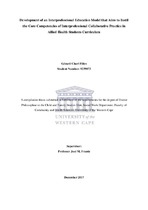Development of an interprofessional education model that aims to instil the core competencies of interprofessional collaborative practice in allied health students curriculum
Abstract
Health Professions Education has not prepared graduates to address the health challenges of
the twenty first century, largely due to fragmented, outdated and static curricula.
Interprofessional education (IPE) is a leading approach to facilitate student learning for future
interprofessional teams in addressing the complex health needs of the community. To achieve
this outcome, different core competencies need to be developed, including 1) interprofessional
communication; 2) patient/client/family/community-centred care; 3) role clarification; 4) team
functioning; 5) collaborative leadership and 6) interprofessional conflict resolution. This study
aims to design an interprofessional education model that endeavours to instil the core
competencies of interprofessional collaborative practice in allied health students. This study
makes use of a mixed methods approach and included a systematic review; a readiness for
interprofessional education survey; a Delphi study; curriculum mapping and model design
aspects.. The data collection methods used included both quantitative and qualitative methods.
The study population for the implementation phase incorporates students from the disciplines
of Nursing, Physiotherapy, Occupational Therapy, Natural Medicine and Social Work
registered for the 2015/2016 academic year. The methodological framework for this study was
Designed Based Research (DBR).

